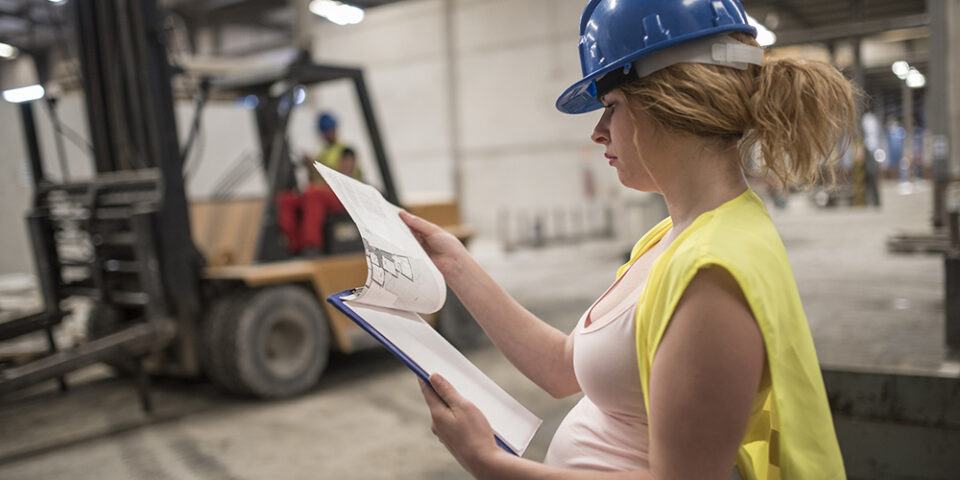How to handle pregnancy symptoms at work
In most cases, women who become pregnant will continue working safely throughout their pregnancy, making a few adjustments to their work environments or tasks. Symptoms of pregnancy like nausea, muscle aches and fatigue can make working while pregnant uncomfortable, and in some cases may impact your ability to work safely. When it comes to how to handle pregnancy symptoms at work, first you need to know whether you are able to safely continue your current job duties.
Sandra Hardee, MD, offered advice on how to handle pregnancy symptoms at work and which tasks you should not do while pregnant.
Is it safe to work while pregnant?
“There are some occupations that may pose risks to women and their developing pregnancy, especially those that include a lot of heavy lifting,” said Dr. Hardee.
Exposure to harmful chemicals or long periods of standing can also cause serious health issues during pregnancy. It’s important to speak with your health care provider about your current work situation so you can determine what’s best for you and your baby.
Employers have a legal obligation to provide reasonable accommodation during pregnancy, so speak up and make sure you and your growing little one are protected.
Are there jobs you shouldn’t do while pregnant?
“As of June 2023, the Pregnant Workers Fairness Act (or PWFA) requires employers covered by the law to provide reasonable accommodations for known limitations related to pregnancy, childbirth or related medical conditions,” said Dr. Hardee.
Tasks you shouldn’t do while pregnant include:
- Heavy lifting or strenuous physical activity
- Tasks involving exposure to harmful chemicals, toxins, radiation, cleaning agents or pesticides
- Tasks involving exposure to extreme heat or cold, which can lead to dehydration, overheating or hypothermia
- Tasks with a high risk of injury, such as construction work or law enforcement
Tips for handling pregnancy symptoms at work
“First off, make sure you keep open communication with your supervisor or HR department about concerns you might have or how your pregnancy-related symptoms may be affecting you,” said Dr. Hardee.
Dr. Hardee recommended eating smaller but more frequent meals throughout the day to help manage nausea. Ginger tea or ginger hard candies can also help to soothe morning sickness. Try to get plenty of rest at home and head to bed early to ensure a good night’s sleep, as this will help to minimize fatigue.
Stay hydrated and eat nutrient-dense snacks to keep your energy levels up.
Finally, plan your bathroom breaks strategically whenever possible, such as before and after meetings or during your designated break times.
What are some signs you should stop working when you’re pregnant?
“Severe or persistent nausea or vomiting may make it impossible to keep up with the demands of your workplace,” said Dr. Hardee. “Excessive fatigue making it difficult to concentrate on or perform your work tasks could also lead to unsafe working conditions.”
Physical discomfort or pain associated with heavy lifting, repetitive movements or prolonged standing could mean you need to modify or even stop your current work duties. High stress levels at work can lead to high blood pressure, significant anxiety or even cause preterm labor. Any of these could make taking medical leave as a precaution to protect your health and the health of your pregnancy a good decision.
What can you do to make the return to work after pregnancy easier?
“Speak with your employer about your plan for your maternity leave and returning to work afterward well in advance, so you can make sure that transition is as smooth as possible,” said Dr. Hardee. “Returning to work with an initially part-time or reduced schedule may be beneficial, since it’ll help see you through the weeks after your leave ends and while your body is still recovering from giving birth.”
Organizing your workspace prior to your return to work can be very helpful. This may include setting up a comfortable pumping station if you’re breastfeeding. Remember that under the Fair Labor Standards Act (or FLSA), employers are required to provide space for breastfeeding employees to pump – and that it has to be space that is not a bathroom and is shielded from the view of or intrusion by other employees or the public.
“Finally, remember that it’s okay to ask for help if you need it,” said Dr. Hardee. “Adjusting to life as a working parent can sometimes be difficult. Just take things one day at a time.”
You deserve a safe and healthy workplace
We help employers improve the health and wellness of their workforce by offering a variety of services that can be tailored to meet their needs.
Learn More
